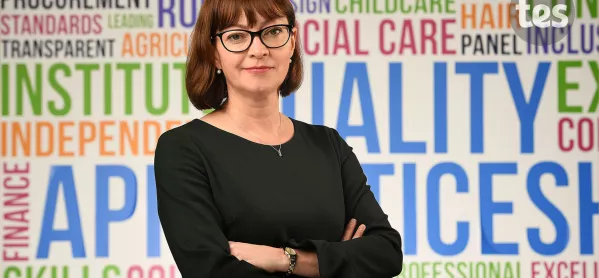Apprenticeships: The challenges of assessment in 2020

The past year has been incredibly challenging for everyone because of the Covid-19 pandemic - including those involved with apprenticeships.
There has, though, been much to celebrate. Thousands of people involved with end point assessment (EPA) and external quality assurance (EQA) worked together with the Institute to roll out a wide variety of special measures, or “flexibilities”.
I’m incredibly proud that these have supported so many apprentices to complete their training and move confidently on with their careers, in spite of the many restrictions.
Jennifer Coupland profile: ‘In challenging times, you see what you’re capable of’
Apprenticeships: ‘Challenging points for improvement’
Youth unemployment: 4 ways to incentivise employers
Today, the Institute for Apprenticeships and Technical Education has published our first annual report summing up the activity of EPA and EQA organisations over the past 12 months. It focuses largely on good progress that is being made with what is still a relatively new form of assessment, including how the institute and wider sector dealt with the many challenges posed by Covid-19.
This year has been far from typical. Assessment methods such as workplace observations and professional discussions were immediately made difficult - if not impossible - during the first national lockdown, by social distancing rules and travel restrictions.
Coronavirus: Adapting apprenticeship assessment
Apprentices also found themselves working in very different roles, including moving to the front-line of the nation’s response to the pandemic, working from home, being furloughed or being made redundant.
None of these circumstances were conducive to the usual approach to EPA.
We needed to adjust fast and, while our top priority throughout has been protecting safety, we have also been acutely conscious of the need to maintain quality and allow as many apprentices as possible to complete and move on in their careers. No one wanted to see them kept in limbo because of the pandemic.
We worked closely with EQA providers, employer groups and assessment organisations to design and approve a wide variety of flexibilities to the way EPA can be delivered, which mostly allowed for greater use of remote technology to allow assessment to be done remotely. These will remain in place until at least the end of March 2021 to provide stability.
Relevant, reliable and robust assessment
What else does the report tell us? EQA activity over the past year has highlighted action that we in the institute can take to better support assessment delivery. For example, we will look at how we can strengthen EPA plans to ensure that they are all as strong as they can be - including those approved prior to the institute’s creation.
It’s clear that the vast majority of assessment is being delivered well and is providing a relevant, reliable and robust assessment of whether apprentices have learned enough to do their jobs to the high standards required. Employers and apprentices who have experienced this value it.
Good EPA is being delivered by a wide range of organisations: large and small, specialist and generalist, established players and new entrants. There is no single right model for organisations.
What is common to all those delivering is that they successfully blend occupational and assessment expertise to design and deliver assessments that are relevant and authentic to the occupation.
Good EPA organisations have also developed robust internal quality assurance systems, seeking out and acting on user feedback and treating the apprentice and employer as key customers.
Less good EPA is delivered by organisations that generally lack either the assessment or occupational expertise possessed by the best end-point assessment organisations.
We have seen very few examples of malpractice or behaviour that would seriously compromise the effective delivery of assessment. Where such cases have presented themselves, we have worked with the Education and Skills Funding Agency and Ofqual to swiftly remedy the situation.
I would like to thank everyone involved with apprenticeship assessment for your incredible efforts over the past 12 months. Have a lovely Christmas break and I look forward to when we return in 2021 to embrace what I hope will be a new year of hope and recovery.
Jennifer Coupland is the chief executive of the Institute for Apprenticeships and Technical Education
You need a Tes subscription to read this article
Subscribe now to read this article and get other subscriber-only content:
- Unlimited access to all Tes magazine content
- Exclusive subscriber-only stories
- Award-winning email newsletters
Already a subscriber? Log in
You need a subscription to read this article
Subscribe now to read this article and get other subscriber-only content, including:
- Unlimited access to all Tes magazine content
- Exclusive subscriber-only stories
- Award-winning email newsletters
topics in this article



